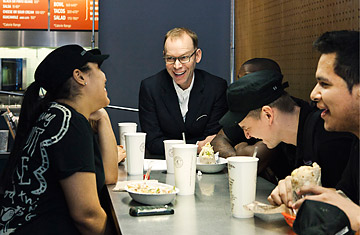
Steve Ells in New York City with Chipotle employees, who are hired based on 13 characteristics, four of which basically mean happy.
(2 of 6)
Ells' goal is to destroy fast food: no more frozen patties, no more microwaves, no more factory farms. That's partly because he's a chef. Not just a burrito chef--all of Chipotle's recipes are his--but a high-end one. In college at the University of Colorado at Boulder, Ells would throw oddly elaborate dinner parties. "Everyone was broke, and he'd make duck confit and meats with wine-reduction sauces," says Monty Moran, an attorney who went to high school and college with Ells and left a Denver law firm seven years ago to become Chipotle's president and now co-CEO. "He'd use the most expensive butter he could find. The best salt he could find on the shelf. He found a way to spend more at a grocery store than anyone else in history." After college, Ells attended the Culinary Institute of America in Hyde Park, N.Y., and went to work at Stars, Jeremiah Tower's famous California-cuisine restaurant in San Francisco. Although Tower, who mentored rising chefs like Mario Batali, never liked working for other people, he says that if he had to, he wouldn't mind working for Ells--despite Ells' reputation for being relentlessly exacting. "I could never work for a wimp," Tower says.
In 1993, at 28, Ells quit Stars, planning to open his own high-end restaurant. To raise the money for it, he opened a burrito restaurant in a former Dolly Madison ice cream parlor in Denver, having been impressed with the taquerias in San Francisco, and named it Chipotle Mexican Grill after a smoked and dried jalapeo pepper. To launch the business, he got $85,000 from his dad, who made a lot of money helping start and then selling a pharmaceutical company. His dad wound up making a whole lot more from that investment in the burrito chain, which went public in 2006 and is currently valued at $12.2 billion.
Building a Better Burrito
Most fast-food chains focus their resources on an endless cycle of creating and marketing new menu items, hoping one sticks, as the McNugget did for McDonald's in 1983. But Chipotle hasn't made any significant changes to its menu because Ells thinks new items would make the place less authentic. The flavors are somewhat bold, but all the dishes are really simple--you choose a meat, a grain and some toppings. "We have developed a few items, and I said, 'Delicious! We're not putting that on the menu, because we don't add new items to the menu.' It's craziness! It's craziness!" Ells says of all the time and money he's spent on new items knowing he'll never add them.
He has, however, recently hired some high-profile chefs--Kyle Connaughton, a former head chef at Britain's Fat Duck, and Nate Appleman, one of Food & Wine's best new chefs of 2009--whose job is to take Chipotle's chicken burrito and make it a slightly better chicken burrito. Recent changes include rehydrating the chipotles differently so they're a little smokier, dicing the onions by hand since food processors removed too much moisture, roasting the tomatillos and charring the jalapeos a bit more. Other fast-food restaurants find ways to shave pennies from their food costs and then focus-group the results to see if customers notice the little differences that over time, argues Ells, make for a much worse-tasting product. "We're doing the opposite," he says. "Maybe you can't tell the difference this year, but down the road you will."
